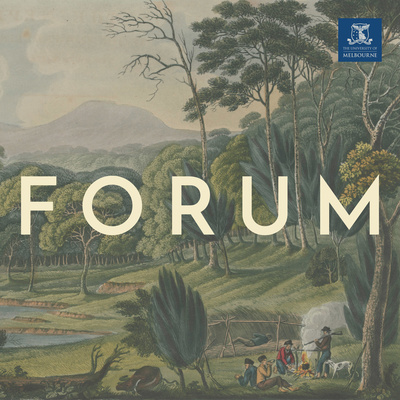
Forum Podcast
By SHAPS @ Melbourne
Credits:
Henry Reese — audio production and music.
Julie Fedor — head of SHAPS Engagement team.
Nicole Davis — website content manager.
Visit our website at blogs.unimelb.edu.au/shaps-research/

Forum PodcastJul 05, 2020

Singing Clocks and Contested Temporalities: Introducing Dr. Matthew Champion
Dr. Matthew Champion, appointed to a Senior Lectureship in History in 2022, is a historian of medieval and early modern Europe, with a particular focus on the experience of time and temporality during periods of intense change. In this interview for the SHAPS Forum podcast, Dr Henry Reese talks with Matthew about his research, including his latest project, The Sounds of Time.
This podcast was produced by the School of Historical and Philosophical Studies at the University of Melbourne. We acknowledge the Traditional Owners of the lands on which our University operates - lands of the Kulin peoples, which includes the Wurundjeri, Boonwurrung Wathaurong, Dja Dja Wurrung and Taungurung peoples, as well as the Yorta Yorta nation. We pay our respects to their Elders, past and present and emerging, and acknowledge that sovereignty to these lands was never ceded.

Control and the Imagery of Power: The Case of Emperor Augustus
Henry Reese speaks with Dr Roslynne Bell, a classicist and art historian, about the methods used by Emperor Augustus to control his public image in Ancient Rome.
This episode marks the first instalment in the 2021 theme of ‘Control’. Each year, SHAPS adopts a special theme, which we explore from the perspectives of scholars working within different disciplines within the School and beyond. In 2020, we explored the theme of ‘Disaster & Change’ from a number of different angles. In our last episode, Professor Mike Arnold helped us wrap up this series by thinking about the past, present and future of death, mourning and the disposal of the dead. In 2021, our focus will be on the topic of Control in all its facets.
The notion of control is something that has been turning up increasingly often in all kinds of different contexts in recent years. From the Brexit campaign with its call to ‘take back control’ to cultural fashions like the Marie Kondo phenomenon, through to criminological and sociological theories on self-control and socialisation, or political discourses around borders and immigration – everywhere we look, we find evidence of an intense preoccupation with ‘control’. A desire for and a drive to control can be identified as a factor common to some of the most important processes underway in the world today.
The COVID-19 pandemic has raised a number of issues around control with new urgency, highlighting tensions between personal liberty and control of public health, for example. In 2021, we will look at the new forms of control that are arising in the 21st century, from Shoshana Zuboff’s concept of ‘surveillance capitalism’, to ‘mindfulness’, which Ronald E. Purser has critiqued as a technique for social control and self-pacification. We’ll be listening to philosophers on the subject of government welfare and the drive to control the unemployed; we’ll be listening to historians on how ideas about control have been applied in the spheres of medicine and psychiatry. We’ll be tracing the long history of ideas, regimes and practices related to control.
So what better place to start than by looking right back to the ancient world and exploring an iconic historical figure and his quest to control his public image. And we have an exceptionally well qualified guide to introduce us to this topic: Dr Roz Bell, welcome to the podcast.
Disaster & Change is a podcast produced by SHAPS, the School of Historical and Philosophical Studies at the University of Melbourne, Australia.
This podcast was produced by the School of Historical and Philosophical Studies at the University of Melbourne. We acknowledge the Traditional Owners of the lands on which our University operates – lands of the Kulin peoples, which includes the Wurundjeri, Boonwurrung Wathaurong, Dja Dja Wurrung and Taungurung peoples, as well as the Yorta Yorta nation. We pay our respects to their Elders, past and present and emerging, and acknowledge that sovereignty to these lands was never ceded.
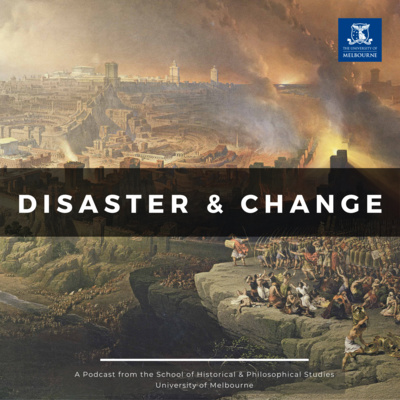
Disaster & Change Part 6 — Mass Graves and Unmarked Coffins: Scholarship at a time of 'Peak Death', with Professor Mike Arnold
The final episode of our 'Disaster & Change' series tackles a topic that has pervaded every other discussion: death. Dr. Henry Reese speaks with Mike Arnold, Professor of History and Philosophy of Science in SHAPS, the School of Historical and Philosophical Studies at the University of Melbourne. Prof. Arnold is part of the DeathTech research group, and their conversation touches on the history, present and future of the death industry.
This podcast was produced by the School of Historical and Philosophical Studies at the University of Melbourne. We acknowledge the Traditional Owners of the lands on which our University operates – lands of the Kulin peoples, which includes the Wurundjeri, Boonwurrung, Wathaurong, Dja Dja Wurrung and Taungurung peoples, as well as the Yorta Yorta nation. We pay our respects to their Elders, past and present and emerging, and acknowledge that sovereignty to these lands was never ceded.

A More Complete History: Dr Annabelle Baldwin on Gender History, The Holocaust, Testimony and Justice in the Classroom
Content warning: this episode contains discussions of sexual violence and genocide.
Dr Henry Reese speaks with Dr Annabelle Baldwin, the newly appointed Lecturer in Gender History in SHAPS, the School of Historical and Philosophical Studies at the University of Melbourne. Their conversation touches on the new Gender Pathway in the History programme at the University, as well as Dr. Baldwin's extensive experience researching gendered violence and the Holocaust.
This podcast was produced by the School of Historical and Philosophical Studies at the University of Melbourne. We acknowledge the Traditional Owners of the lands on which our University operates – lands of the Kulin peoples, which includes the Wurundjeri, Boonwurrung, Wathaurong, Dja Dja Wurrung and Taungurung peoples, as well as the Yorta Yorta nation. We pay our respects to their Elders, past and present and emerging, and acknowledge that sovereignty to these lands was never ceded.

A Shipwreck and A Song: Isabel Hollingdale on Family History, Creativity and the Women of WWII.
Isabel Hollingdale is an undergraduate student in History at SHAPS. She recently produced a song as part of the third year capstone course 'Making History.' Henry Reese spoke to Isabel about her motivations, creative process, and the relationship between imagination and history research. The episode contains Isabel's song, 'The Western Prince,' in full.
This podcast was produced by the School of Historical and Philosophical Studies at the University of Melbourne. We acknowledge the Traditional Owners of the lands on which our University operates – lands of the Kulin peoples, which includes the Wurundjeri, Boonwurrung, Wathaurong, Dja Dja Wurrung and Taungurung peoples, as well as the Yorta Yorta nation. We pay our respects to their Elders, past and present and emerging, and acknowledge that sovereignty to these lands was never ceded.

Storytelling, Performance and Inspiration: Introducing Dr Julia Hurst, Lecturer in Aboriginal and Torres Strait Islander History.
Dr Henry Reese had the opportunity to talk to Dr Julia Hurst, newly appointed lecturer in Aboriginal and Torres Strait Islander History at the University of Melbourne.
Dr Hurst’s appointment reflects the strong desire in the History program to offer students the opportunity to study subjects in Aboriginal and Torres Strait Islander history taught by an Indigenous historian, to diversify the approaches and methodologies taught and used by historians in the History program and to better reflect the history of our region. Dr Hurst will commence teaching indigenous history next year in the existing subject Global Histories of Indigenous Activism and the new subject Introduction to Indigenous History.
This podcast was produced by the School of Historical and Philosophical Studies at the University of Melbourne. We acknowledge the Traditional Owners of the lands on which our University operates – lands of the Kulin peoples, which includes the Wurundjeri, Boonwurrung, Wathaurong, Dja Dja Wurrung and Taungurung peoples, as well as the Yorta Yorta nation. We pay our respects to their Elders, past and present and emerging, and acknowledge that sovereignty to these lands was never ceded.

Confronting the History of Race and Empathy in the Classroom: A Conversation with Dr. Sarah Walsh.
In this interview, History PhD candidate Amy Hodgson talks with our newly appointed Hansen Lecturer in Global History, Dr Sarah Walsh, who specialises in the history of ideas about race and racism, with a particular focus on Latin America. The conversation traverses a wide range of topics, including the challenges posed by online teaching, especially when it comes to handling difficult and confronting histories of oppression and violence. What approaches can be used to foster empathy and kindness in the classroom? What methods can researchers working on these topics use in order to take care of their own mental health and wellbeing? And what are some useful starting points for people who want to educate themselves about issues around race and racism?
This podcast was produced by the School of Historical and Philosophical Studies at the University of Melbourne. We acknowledge the Traditional Owners of the lands on which our University operates – lands of the Kulin peoples, which includes the Wurundjeri, Boonwurrung, Wathaurong, Dja Dja Wurrung and Taungurung peoples, as well as the Yorta Yorta nation. We pay our respects to their Elders, past and present and emerging, and acknowledge that sovereignty to these lands was never ceded.

Disaster & Change Part 5 — Statues, Heritage & the French Revolution, with Professor Peter McPhee.
Statues, Heritage & the French Revolution
Societies have always used statues and other monuments as ways of recognising power and eminence. In Australia, as in many other places, there is currently public debate over whether some statues should be removed, who should make the decision, and what should be the fate of the statues themselves. Should they be displayed with explanatory plaques, taken away to be preserved in museums or simply removed? Such debates are common in history. This podcast surveys the wide range of objects destroyed during the French Revolution – from buildings and statues to books and paintings – but also the remarkable responses of revolutionary governments. It concludes with some reflections about the place of monumental statues and heritage sites in Australia.
Peter McPhee was appointed to a Personal Chair in History at the University of Melbourne in 1993. He has published widely on the history of modern France, most recently Robespierre: a Revolutionary Life (2012); and Liberty or Death: the French Revolution (2016). He was Chair of the History Department 1996-99. He was appointed to the position of Deputy Vice-Chancellor (Academic) in 2003 before becoming the University's first Provost in 2007-09, with responsibility for the design and implementation of the University's new curriculum structures. He became a Member of the Order of Australia in 2012. He is currently the Chair of the History Council of Victoria, the state’s peak body for history.
Disaster & Change is a special series of Forum, a podcast produced by SHAPS, the School of Historical and Philosophical Studies at the University of Melbourne, Australia.
This podcast was produced by the School of Historical and Philosophical Studies at the University of Melbourne. We acknowledge the Traditional Owners of the lands on which our University operates – lands of the Kulin peoples, which includes the Wurundjeri, Boonwurrung, Wathaurong, Dja Dja Wurrung and Taungurung peoples, as well as the Yorta Yorta nation. We pay our respects to their Elders, past and present and emerging, and acknowledge that sovereignty to these lands was never ceded.
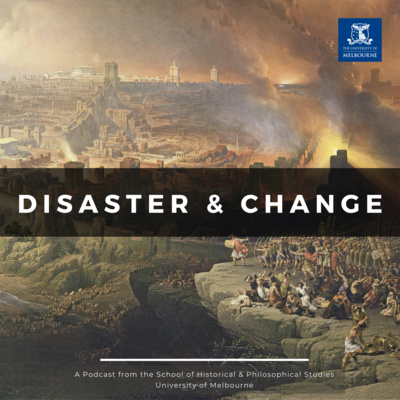
Disaster & Change Part 4 — Disaster and Change in Republican Rome, with Professor Nathan Rosenstein.
Disaster and Change in Republican Rome
The catastrophic defeat Hannibal inflicted on Rome at Cannae in 216 BC forced the Republic to drastically change how it would fight the Second Punic War. A strategy of direct military confrontation had to be abandoned in favour of a war of attrition. This strategic shift necessitated a series of additional changes in how Rome mobilised, led, and supported its armies. These changes not only provided the foundation for the Republic’s eventual victory over Hannibal but also for its rapid conquest of the Mediterranean over the following half century.
Nathan Rosenstein is Professor Emeritus in the Department of History at The Ohio State University. A specialist in Roman Republican history, he is the author or co-editor of several books, including Rome and the Mediterranean, 290-146 B.C.: The Imperial Republic and A Companion to the Roman Republic. He is currently co-editing The Oxford History of the Roman World.
Disaster & Change is a special series of Forum, a podcast produced by SHAPS, the School of Historical and Philosophical Studies at the University of Melbourne, Australia.
This podcast was produced by the School of Historical and Philosophical Studies at the University of Melbourne. We acknowledge the Traditional Owners of the lands on which our University operates – lands of the Kulin peoples, which includes the Wurundjeri, Boonwurrung, Wathaurong, Dja Dja Wurrung and Taungurung peoples, as well as the Yorta Yorta nation. We pay our respects to their Elders, past and present and emerging, and acknowledge that sovereignty to these lands was never ceded.
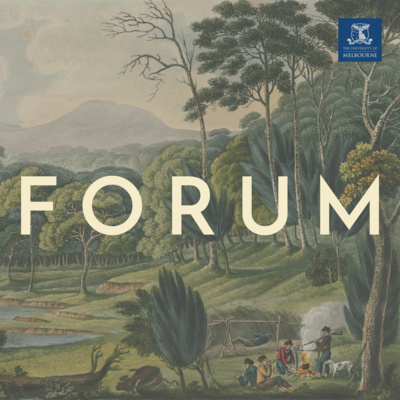
'Democratic Adventurer': Book Talk with Professor Sean Scalmer and Jimmy Yan.
University of Melbourne postgraduate student Jimmy Yan interviews Professor Sean Scalmer about his new book, Democratic Adventurer: Graham Berry and the Making of Australian Politics, which launches on 25 May 2020 on Monash University Press.
The publisher's summary of Democratic Adventurer reads as follows:
Graham Berry (1822-1904) was colonial Australia’s most gifted, creative and controversial politician. A riveting speaker, a newspaper proprietor and editor, and the founder of Australia’s first mass political party, he wielded these tools to launch an age of reform: spearheading the adoption of a ‘protectionist’ economic policy, the payment of parliamentarians, and the taxing of large landowners. He also sought the reform of the Constitution, precipitating a crisis that the London Times likened to a ‘revolution’. This book recovers Berry’s forgotten and fascinating life. It explores his drives and aspirations, the scandals and defeats that nearly derailed his career, and his remarkable rise from linen-draper and grocer to adored popular leader. It establishes his formative influence on later Australian politics. And it also uses Berry’s life to reflect on the possibilities and constraints of democratic politics, hoping thereby to enrich the contemporary political imagination.
Forum is a podcast produced by SHAPS, the School of Historical and Philosophical Studies at the University of Melbourne, Australia.
This podcast was produced by the School of Historical and Philosophical Studies at the University of Melbourne. We acknowledge the Traditional Owners of the lands on which our University operates - lands of the Kulin peoples, which includes the Wurundjeri, Boonwurrung, Wathaurong, Dja Dja Wurrung and Taungurung peoples, as well as the Yorta Yorta nation. We pay our respects to their Elders, past and present and emerging, and acknowledge that sovereignty to these lands was never ceded.
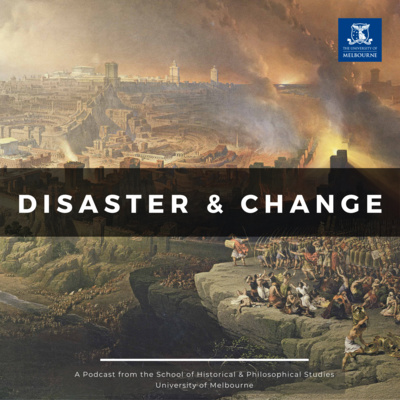
Disaster & Change Part 3 — Explaining Change: Aristotle and the Pandemic, with Professor Margaret Cameron.
Explaining Change: Aristotle and the Pandemic
This podcast episode is intended to help us think through our current situation during the global coronavirus pandemic. The focus of this episode is on understanding the phenomenon of change, or more specifically, how we understand the causes of change. This is a philosophical discussion, although I have prepared it in a way that presumes its listeners, namely all of you, do not necessarily have any philosophical background. It is also a discussion about how to think about living our lives – indeed about restructuring our lives – as a consequence of having had this collective experience. In sum, I will try to take you through how Aristotle might have understood the purpose of the pandemic.
Disaster & Change is a special series of Forum, a podcast produced by SHAPS, the School of Historical and Philosophical Studies at the University of Melbourne, Australia.
This podcast was produced by the School of Historical and Philosophical Studies at the University of Melbourne. We acknowledge the Traditional Owners of the lands on which our University operates - lands of the Kulin peoples, which includes the Wurundjeri, Boonwurrung, Wathaurong, Dja Dja Wurrung and Taungurung peoples, as well as the Yorta Yorta nation. We pay our respects to their Elders, past and present and emerging, and acknowledge that sovereignty to these lands was never ceded.
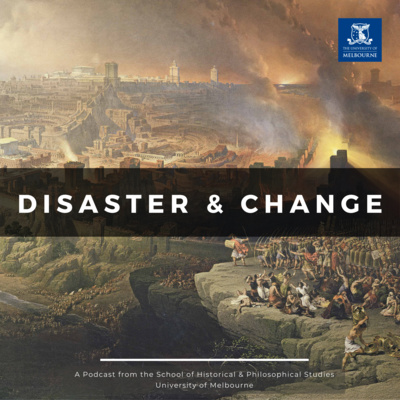
Disaster & Change Part 2 — Does Disaster inevitably lead to political change? The case of the Soviet Union and World War II, with Professor Mark Edele.
Does Disaster inevitably lead to political change? The case of the Soviet Union and World War II
Does an unplanned and large-scale calamity – a war, say, or a global economic crisis – lead to lasting social, cultural, and political change? This podcast explores this question with regard to the Soviet Union and World War II. The calamity of the war had a devastating impact on Soviet society, on the Soviet economy, and on the Soviet population. Hopes for social and political change were high in 1945, but they were nearly universally disappointed. The dictatorship and the command economy, which had been adapted during the catastrophe of the war, snapped back into their pre-war mould. And yet, there were subterranean changes in politics, the economy, and society, which would work themselves out over the coming decades. The podcast explains some of these changes and ends by drawing larger conclusions on the relationship between disaster and change.
Mark Edele is Hansen Professor of History and Deputy Head of School of the School of Historical and Philosophical Studies. Parts of this podcast use material from his current book project Stalinism at War. The Soviet Union in World War II. Some sections have been published as Mark Edele, "The Soviet Culture of Victory," Journal of Contemporary History 54, No. 4 (2019): 780-98. The book on veterans mentioned in the podcast is Martin Crotty, Neil J. Diamant and Mark Edele, The Politics of Veteran Benefits in the Twentieth Century. A Comparative History (Cornell University Press, 2020).
Disaster & Change is a special series of Forum, a podcast produced by SHAPS, the School of Historical and Philosophical Studies at the University of Melbourne, Australia.
This podcast was produced by the School of Historical and Philosophical Studies at the University of Melbourne. We acknowledge the Traditional Owners of the lands on which our University operates - lands of the Kulin peoples, which includes the Wurundjeri, Boonwurrung, Wathaurong, Dja Dja Wurrung and Taungurung peoples, as well as the Yorta Yorta nation. We pay our respects to their Elders, past and present and emerging, and acknowledge that sovereignty to these lands was never ceded.
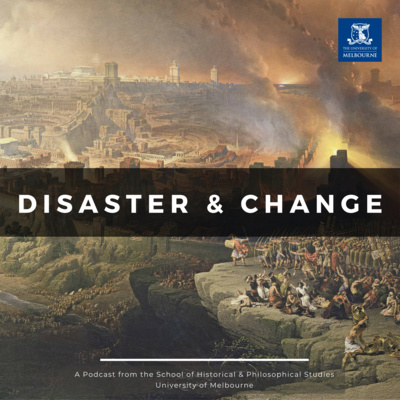
Disaster & Change Part 1 — In the Midst of Death There is Life: Collapse and Recovery from the Four Horsemen of the Apocalypse, with Professor Janet McCalman.
In the Midst of Death There is Life: Collapse and Recovery from the Four Horsemen of the Apocalypse
Professor Janet McCalman opens our new podcast series by discussing the recent bushfire and Covid-19 coronavirus crises and Australia's political pitfalls and opportunities.
Disaster & Change is a special series of Forum, a podcast produced by SHAPS, the School of Historical and Philosophical Studies at the University of Melbourne, Australia.
This podcast was produced by the School of Historical and Philosophical Studies at the University of Melbourne. We acknowledge the Traditional Owners of the lands on which our University operates - lands of the Kulin peoples, which includes the Wurundjeri, Boonwurrung, Wathaurong, Dja Dja Wurrung and Taungurung peoples, as well as the Yorta Yorta nation. We pay our respects to their Elders, past and present and emerging, and acknowledge that sovereignty to these lands was never ceded.
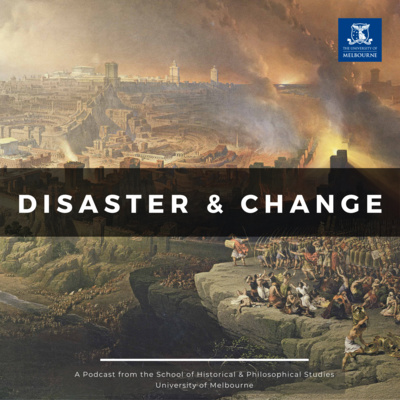
Introducing Disaster & Change: Professor Margaret Cameron.
Professor Margaret Cameron, head of SHAPS, introduces the new podcast series.
Disaster & Change is a special series of Forum, a podcast produced by SHAPS, the School of Historical and Philosophical Studies at the University of Melbourne, Australia.
This podcast was produced by the School of Historical and Philosophical Studies at the University of Melbourne. We acknowledge the Traditional Owners of the lands on which our University operates - lands of the Kulin peoples, which includes the Wurundjeri, Boonwurrung, Wathaurong, Dja Dja Wurrung and Taungurung peoples, as well as the Yorta Yorta nation. We pay our respects to their Elders, past and present and emerging, and acknowledge that sovereignty to these lands was never ceded.